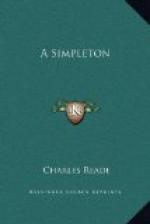The next moment they turned a corner and came upon the rest of their party, hitherto hidden by the apricot hedge and a turning in the road. A blue-black Kafir, with two yellow Hottentot drivers, man and boy, was harnessing, in the most primitive mode, four horses on to the six oxen attached to the wagon; and the horses were flattening their ears, and otherwise resenting the incongruity. Meantime a fourth figure, a colossal young Kafir woman, looked on superior with folded arms, like a sable Juno looking down with that absolute composure upon the struggles of man and other animals, which Lucretius and his master Epicurus assigned to the Divine nature. Without jesting, the grandeur, majesty, and repose of this figure were unsurpassable in nature, and such as have vanished from sculpture two thousand years and more.
Dick Dale joined the group immediately, and soon arranged the matter. Meantime, Phoebe descended from the wagon, and welcomed Christopher very kindly, and asked him if he would like to sit beside her, or to walk.
He glanced into the wagon; it was covered and curtained, and dark as a cupboard. “I think,” said he, timidly, “I shall see more of the past out here.”
“So you will, poor soul,” said Phoebe kindly, “and better for your health: but you must not go far from the wagon, for I’m a fidget; and I have got the care of you now, you know, for want of a better. Come, Ucatella; you must ride with me, and help me sort the things; they are all higgledy-piggledy.” So those two got into the wagon through the back curtains. Then the Kafir driver flourished his kambok, or long whip, in the air, and made it crack like a pistol, and the horses reared, and the oxen started and slowly bored in between them, for they whinnied, and kicked, and spread out like a fan all over the road; but a flick or two from the terrible kambok soon sent them bleeding and trembling and rubbing shoulders, and the oxen, mildly but persistently goring their recalcitrating haunches, the intelligent animals went ahead, and revenged themselves by breaking the harness. But that goes for little in Cape travel.
The body of the wagon was long and low and very stout. The tilt strong and tight-made. The roof inside, and most of the sides, lined with green baize. Curtains of the same to the little window and the back. There was a sort of hold literally built full of purchases; a small fireproof safe; huge blocks of salt; saws, axes, pickaxes, adzes, flails, tools innumerable, bales of wool and linen stuff, hams, and two hundred empty sacks strewn over all. In large pigeon-holes fixed to the sides were light goods, groceries, collars, glaring cotton handkerchiefs for Phoebe’s aboriginal domestics, since not every year did she go to Cape Town, a twenty days’ journey by wagon: things dangled from the very roof; but no hard goods there, if you please, to batter one’s head in a spill. Outside were latticed grooves with tent, tent-poles, and rifles. Great pieces of cork, and bags of hay and corn, hung dangling from mighty hooks—the latter to feed the cattle, should they be compelled to camp out on some sterile spot on the Veldt, and methinks to act as buffers, should the whole concern roll down a nullah or little precipice, no very uncommon incident in the blessed region they must pass to reach Dale’s Kloof.




